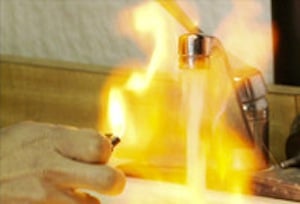A new peer-reviewed study from Duke University shows that drinking water in areas within a half-mile of fracking wells can become contaminated with dangerous levels of methane – enough to catch on fire if lit. The report says that the levels of methane in some areas of Pennsylvania and New York are so great that they pose a significant fire and explosion hazard.
The study was published this week in the Proceedings of the National Academy of Sciences. One of the study’s authors, Duke environmental science professor Robert Jackson, says that the threat of explosions in this drinking water are real and need to be dealt with. From a CNN report:
“The study said about half of the 68 drinking water wells tested in Pennsylvania and New York located within a half a mile from natural gas wells had high levels of methane – the prime ingredient in natural gas fuel…The gas, which is usually located thousands of feet below the water table, appears to be entering the water wells either through cracks in the bedrock or, more likely, the casing in natural gas wells… Casings are steel and concrete barriers natural gas companies use to line a well where it passes through the water table.”
There is currently not any evidence to suggest that ingesting methane in drinking water poses a significant threat to human health, but the threat of having explosive drinking water is inherently bad news.
Explosive water isn’t the only problem these areas could be facing. The researchers at Duke also warn that the numerous chemicals used in the fracking process could easily seep into the water supply as the methane has.
DeSmogBlog released our “Fracking The Future” report last week outlining the many dangers of fracking, as well as the concerns amongst those in the scientific community over the continued practice of hydraulic fracturing. In addition, we have repeatedly posted information on the dangerous chemicals that are used in the fracking process, as well as the warnings from Congress on the dangers associated with the procedure.
The Duke study adds another negative mark on the unconventional gas industry’s tarnished record, and further exposes that this high cost energy poses serious risks to health and water quality. The Duke study vindicates the many property owners who have reported flammable or tainted water near fracking operations at unconventional gas wells. The burden of proof is now firmly on the gas industry to demonstrate whether fracking can ever be done safely.
Subscribe to our newsletter
Stay up to date with DeSmog news and alerts







